Jul 20
Posted: under photography, Wildlife.
Tags: beauty, insect, photography July 20th, 2010
Today when hanging up the wash, I spotted something small on the end of a clothespin that was hanging upside down from the line. It was the same mottled dull gray-brown as the clothespin itself, and it was between the V of the angled ends. I carefully removed the clothespin from the line and put […] [...more]
Today when hanging up the wash, I spotted something small on the end of a clothespin that was hanging upside down from the line. It was the same mottled dull gray-brown as the clothespin itself, and it was between the V of the angled ends. I carefully removed the clothespin from the line and put it on the table, then went to get my camera. After a fruitless search for the macro lens (I put it somewhere safe. Very safe. Too safe) I had to use the zoom lens, which is a sort of zoom macro but won’t focus closer than about 18 inches. Read the rest of this entry »

Jul 09
Posted: under photography, Wildlife.
Tags: beauty, dragonfly, insect, odonates, photography July 9th, 2010
Today, after the rains of the past two weeks–and then a hot sunny midday–we had more species of odonates at the lily pond than I’ve seen yet this year. And the males all wanted a landing site on this stick: [...more]
Today, after the rains of the past two weeks–and then a hot sunny midday–we had more species of odonates at the lily pond than I’ve seen yet this year. And the males all wanted a landing site on this stick:
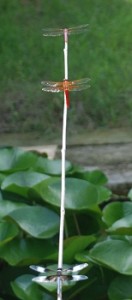 Read the rest of this entry »
Read the rest of this entry »

Jul 01
Posted: under photography, Plantlife, Water, Wildlife.
Tags: Animal behavior, beauty, dragonfly, insect, observation, odonates, photography July 1st, 2010
When I went out yesterday about noon, I found four of these lovely pink waterlily flowers open: [...more]
When I went out yesterday about noon, I found four of these lovely pink waterlily flowers open:
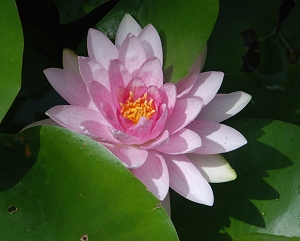 Read the rest of this entry »
Read the rest of this entry »

Jun 29
Posted: under Mortality, photography, Wildlife.
Tags: Animal behavior, beauty, butterflies, dragonfly, photography, predation, spider June 29th, 2010
We had thunder and rain this afternoon for several hours, but around six, sun broke through enough to illuminate the newly refilled lily pond. I went out to see what was going on with pondlife. Two male Neon Skimmers, Libellula croceipennis, were harrassing the four or five male Blue Dashers, Pachydiplax longipennis, and also pestering […] [...more]
We had thunder and rain this afternoon for several hours, but around six, sun broke through enough to illuminate the newly refilled lily pond. I went out to see what was going on with pondlife. Two male Neon Skimmers, Libellula croceipennis, were harrassing the four or five male Blue Dashers, Pachydiplax longipennis, and also pestering the two female Neon Skimmers who were ovipositing in the pond.
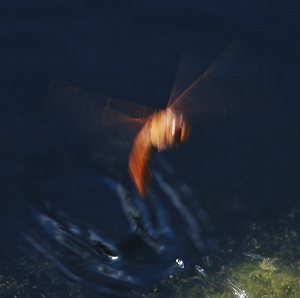
Read the rest of this entry »

Jun 15
Posted: under Pollution.
Tags: migration, Pollution June 15th, 2010
Although we are over two-hundred straight-line miles from the Gulf, we are smack dab in the middle of the Central Flyway, by which birds pass north and south from their breeding grounds to their wintering grounds. So with the first news of the oil gusher in the Gulf, my thoughts leaped past the wildlife present […] [...more]
Although we are over two-hundred straight-line miles from the Gulf, we are smack dab in the middle of the Central Flyway, by which birds pass north and south from their breeding grounds to their wintering grounds. So with the first news of the oil gusher in the Gulf, my thoughts leaped past the wildlife present to be damaged by the oil immediately, to those who would be arriving from the north–exhausted and hungry–to find their migration stopovers and their wintering grounds untenable.
Read the rest of this entry »

Jun 13
Posted: under Climate Change.
Tags: carbon cycle, climate, prairie restoration, wildlife management June 13th, 2010
Carbon sequestration is the trapping of atmospheric carbon (carbon dioxide) into some form where it can stay for decades. Carbon sequestration occurs naturally by the actions of plants, especially long-lived vegetation, and in certain soils, where it’s deposited as slow-decaying organic matter. Plants use sunlight to convert atmospheric carbon dioxide into the chemical that make […] [...more]
Carbon sequestration is the trapping of atmospheric carbon (carbon dioxide) into some form where it can stay for decades. Carbon sequestration occurs naturally by the actions of plants, especially long-lived vegetation, and in certain soils, where it’s deposited as slow-decaying organic matter. Plants use sunlight to convert atmospheric carbon dioxide into the chemical that make up plant material–simple sugars, to start with, then starches and more complex chemicals when added to other nutrients.
Why is this of interest in wildlife management or prairie restoration? The obvious reason is climate change caused by increasing carbon dioxide levels. Carbon sequestration by changes in management of both public and private lands is one way to get carbon dioxide out of the atmosphere and into plant materials. Many of the things a land manager might do to promote wildlife or restore an original ecosystem (forest or grassland) will have multiple benefits…including carbon sequestration.
Read the rest of this entry »

Jun 06
Posted: under photography, Plantlife, Wildlife.
Tags: beauty, butterflies, insect, photography, prairie restoration June 6th, 2010
A few pictures from a week ago, May 30, and also from yesterday, June 5, as what’s blooming and in what abundance changes rapidly–especially in the hot, dry weather we’re having. (We did get 3/10 of an inch of rain. It barely wet the ground.) Variegated Fritillary, Euptoita claudia, on Gaillardia [...more]
A few pictures from a week ago, May 30, and also from yesterday, June 5, as what’s blooming and in what abundance changes rapidly–especially in the hot, dry weather we’re having. (We did get 3/10 of an inch of rain. It barely wet the ground.)
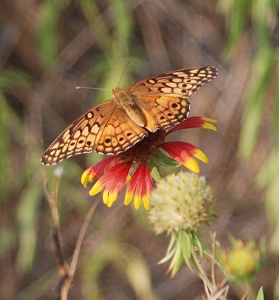 Variegated Fritillary, Euptoita claudia, on Gaillardia
Variegated Fritillary, Euptoita claudia, on Gaillardia
Read the rest of this entry »

May 29
Posted: under photography, Plantlife.
Tags: beauty, native plants, photography, prairie restoration May 29th, 2010
Near Meadow: Claspleaf Coneflower and Lemon Horsemint [...more]
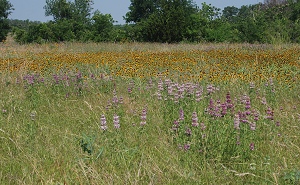 Near Meadow: Claspleaf Coneflower and Lemon Horsemint
Near Meadow: Claspleaf Coneflower and Lemon Horsemint
Read the rest of this entry »

May 28
Posted: under photography, Plantlife, Wildlife.
Tags: beauty, beetle, butterflies, photography, prairie restoration May 28th, 2010
The basketflower, Centaurea americana, looks much like a thistle at first…but the stem and leaves are not prickly at all. It’s a favorite of Black Swallowtail butterflies (and Giant Swallowtails, if there’s enough moisture for the flowers to last into summer) and many smaller butterflies. And also other insects. Beetle flying toward Basketflower already occupied […] [...more]
The basketflower, Centaurea americana, looks much like a thistle at first…but the stem and leaves are not prickly at all. It’s a favorite of Black Swallowtail butterflies (and Giant Swallowtails, if there’s enough moisture for the flowers to last into summer) and many smaller butterflies. And also other insects.
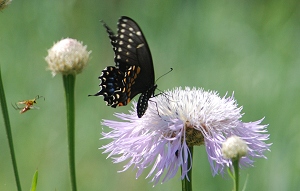 Beetle flying toward Basketflower already occupied by Black Swallowtail
Beetle flying toward Basketflower already occupied by Black Swallowtail
Read the rest of this entry »

May 24
Posted: under Activities, Climate Change, Water, Wildlife.
Tags: Activities, amphibians, Animal behavior, beauty, documentation, observation, photography, wildlife management May 24th, 2010
Young Rana berlandieri with last of its tail showing. [...more]
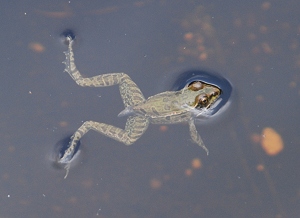 Young Rana berlandieri with last of its tail showing.
Young Rana berlandieri with last of its tail showing.
Read the rest of this entry »








